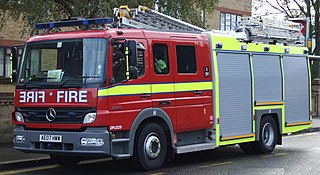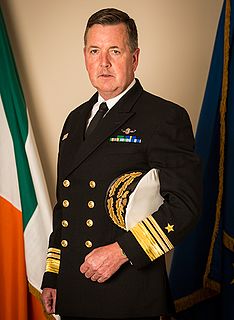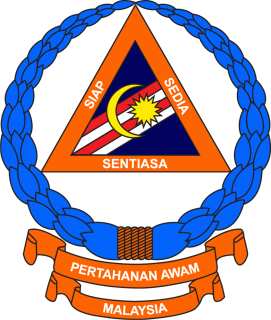Related Research Articles

Civil defense or civil protection is an effort to protect the citizens of a state from military attacks and natural disasters. It uses the principles of emergency operations: prevention, mitigation, preparation, response, or emergency evacuation and recovery. Programs of this sort were initially discussed at least as early as the 1920s and were implemented in some countries during the 1930s as the threat of war and aerial bombardment grew. It became widespread after the threat of nuclear weapons was realized.
The Civil Contingencies Secretariat (CCS), created in July 2001, is the executive department of the British Cabinet Office responsible for emergency planning in the UK. The role of the secretariat is to ensure the United Kingdom's resilience against disruptive challenge, and to do this by working with others to anticipate, assess, prevent, prepare, respond and recover. Until its creation in 2001, emergency planning in Britain was the responsibility of the Home Office. The CCS also supports the Civil Contingencies Committee, also known as COBR.

The Ministry of Defence is the British government department responsible for implementing the defence policy set by Her Majesty's Government, and is the headquarters of the British Armed Forces. It is the UK's ministry of defence.

The Defence Forces are the armed forces of Ireland. They encompass the Army, Air Corps, Naval Service and Reserve Defence Forces.
The Radiological Protection Institute of Ireland (RPII), An Institiúid Éireannach um Chosaint Raideolaíoch, was an independent public body in Ireland under the aegis of the Department of Communications, Climate Action and Environment. The RPII was established in 1992 under the Radiological Protection Act 1991, which conferred on the RPII a broad remit in relation to radiological protection in Ireland. The RPII was merged with the Environmental Protection Agency (EPA) in August 2014, as part of the Irish Government's Public Sector Reform Plan. RPII's functions are now carried out by the Office of Radiation Protection and Environmental Monitoring within the EPA.

The Minister of the Interior is an important position in the Government of France. The office is equivalent to the Interior Minister of other countries, like the Home Secretary of the United Kingdom, the Minister of Public Safety in Canada or similar to a combination of the Attorney General and Secretary of Homeland Security in the United States.
The Australian Intelligence Community (AIC) and the National Intelligence Community (NIC) or National Security Community of the Australian Government are the collectives of statutory intelligence agencies, policy departments, and other government agencies concerned with protecting and advancing the national security and national interests of the Commonwealth of Australia. The intelligence and security agencies of the Australian Government have evolved since the Second World War and the Cold War and saw transformation and expansion during the Global War on Terrorism with military deployments in Afghanistan, Iraq and against ISIS in Syria. Key international and national security issues for the Australian Intelligence Community include terrorism and violent extremism, cybersecurity, transnational crime, the rise of China, and Pacific regional security.

The Department of Defence is the department of the Government of Ireland that is responsible for preserving peace and security in Ireland. The department is led by the Minister for Defence.

The fire services in the United Kingdom operate under separate legislative and administrative arrangements in England and Wales, Northern Ireland, and Scotland.
The counter-terrorism page primarily deals with special police or military organizations that carry out arrest or direct combat with terrorists. This page deals with the other aspects of counter-terrorism:

The Ministry of Defence, is an executive ministry of the Government of Pakistan, tasked in defending Pakistan's national interests and values at home and abroad. It plays a major supporting role to the Pakistan Armed Forces and coordinates with a range of domestic, foreign and inter-governmental bodies.

The Ministry of Home Affairs is a ministry of the Government of Indonesia responsible for internal matters of the state. It is headed by the Minister of Home Affairs, currently Tito Karnavian.

The Ministry of Defence Police (MDP) is a civilian special police force which is part of the United Kingdom's Ministry of Defence. The MDP's primary responsibilities are to provide armed security and counter terrorism services to designated high-risk areas, as well as uniformed policing and limited investigative services to Ministry of Defence property, personnel, and installations throughout the United Kingdom. The MDP are not military police and should not be confused with the Royal Military Police or any other British Service Police.
Many countries around the world have civil defense organizations dedicated to protecting civilians from military attacks and providing rescue services after widespread disasters. In most countries, civil defense is a government-managed and often volunteer-staffed organization.

The Chief of Staff of the Defence Forces (COS) is charged with the executive management of the Irish Defence Forces, and is the most senior military officer of the Army, Naval Service and Air Corps branches. The Chief of Staff is appointed by the President of Ireland, who is the Supreme Commander of the Defence Forces, on the recommendation of the Minister for Defence subject to the approval of the Government of Ireland. The office of the Chief of Staff consists of his personal staff, a strategic planning office and a public relations section.

The National Cyber Security Centre (NCSC) is a government computer security organisation in Ireland, an operational arm of the Department of the Environment, Climate and Communications. The NCSC was developed in 2013 and formally established by the Irish government in July 2015. It is responsible for Ireland's cyber security, with primary focus on securing government networks, protecting critical national infrastructure, and assisting businesses and citizens in protecting their own systems. The NCSC incorporates the Computer Security Incident Response Team (CSIRT-IE).

The National Security Committee (NSC) of Ireland is a secretive inter-departmental committee responsible for ensuring that the Taoiseach and Government of Ireland are kept informed of high-level national security, intelligence and defence issues, and the state's response to them.

The Malaysia Civil Defence Force or popularly known as APM or MCDF is the civil defence services agency in Malaysia, until 31 August 2016 the Civil Defence Department.

The National Security Committee (NSC), also known as National Security Committee of Cabinet, is the peak decision-making body for national security and major foreign policy matters in the Australian Government. It is a committee of the Cabinet of Australia though decisions of the NSC do not require the endorsement of the Cabinet itself.
The National Public Health Emergency Team is a group within Ireland's Department of Health that, according to former Minister for Health Simon Harris, is currently "overseeing and providing direction and expert advice across the health service and the wider public service, on the national response to" coronavirus disease 2019 (COVID-19).
References
- 1 2 "Government Structures". Office of Emergency Planning (OEP). Retrieved 11 July 2015.
- ↑ "Draft National Risk Assessment 2015, Overview of Strategic Risks" (PDF). Department of the Taoiseach. Retrieved 11 July 2015.
- ↑ "OEP Frequently asked questions (FAQs)". Office of Emergency Planning. Retrieved 11 July 2015.
- ↑ "Major Emergencies". OEP. Retrieved 11 July 2015.
- ↑ "Emergency Planning Objectives" (PDF). OEP, Dept. of Defence. Retrieved 11 July 2015.
- ↑ "Annual Report 2013" (PDF). Department of Defence and Defence Forces. Retrieved 13 July 2015.